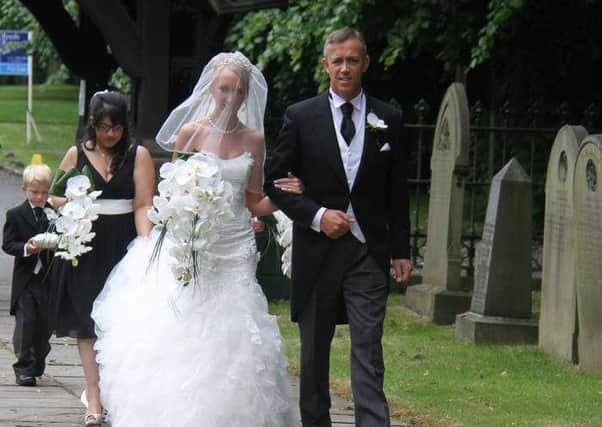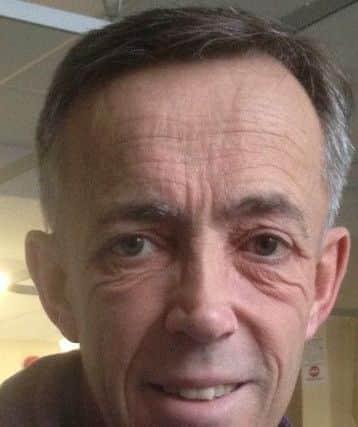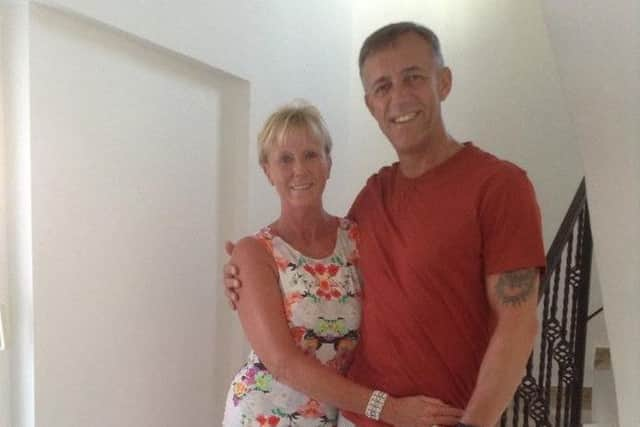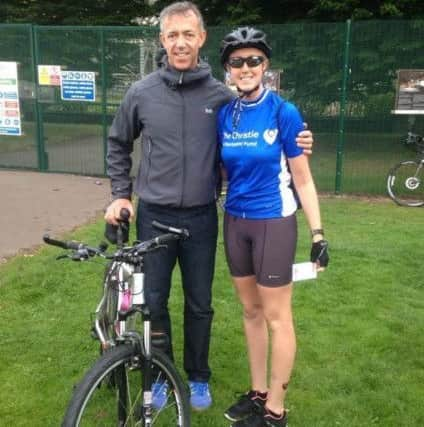'Being a blood donor saved my life by picking up signs of kidney cancer'


It was a spur of the moment decision that had life changing consequences.
Peter Flynn, who was a police officer for 24 years, was in the office one day when he glanced up and saw the blood donation van and thought: ‘I must go and give blood.’
Advertisement
Hide AdAdvertisement
Hide AdPeter, now 55, who lives in Hutton, near Preston and is married to Caron and has daughter Samantha, 26 and son Dean, 22, explains: “I had been giving blood for 10 years and it was something I always did.


“On this occasion, after spotting the donation van, I forewent my dinner time and went to give blood.
“However, when they pricked my finger and tested, they said I was unsuitable for giving blood as my iron levels were very low.”
Peter, a conflict management specialist who taught police officers physical skills, was fit and healthy and ate a diet rich in protein with fish, chicken and vegetables, thought it was impossible for his iron levels to be low.
Advertisement
Hide AdAdvertisement
Hide AdHe was advised to go and see his GP to see if there was an underlying issue.


Peter, who is now a licence enforcement officer Rossendale Council but will be finishing in a few months, says: “Things could have been very different if I had not seen the blood donor van that day and decided to go and donate or if I had not acted on their advice to go and seen the doctor.”
Peter went to his GP and underwent a series of tests over the course of around 10 months.
Every time the results came back, they showed his blood was abnormal but were unable to identify why so Peter was referred to hospital.
Advertisement
Hide AdAdvertisement
Hide AdAn ultrasound scan found a disparity between Peter’s left and right kidney. A few weeks later, Peter was told he had a tumour on his right kidney.


Peter had surgery to remove his kidney and after recovering, he began to live life as normal but was told he needed yearly scans for 10 years.
Eight years after the surgery in 2016, a scan showed shadows on Peter’s lungs and two tumours were found on his left lung and two on his right lung.
Peter was put on a high dose of Interleukin-2 treatment for kidney cancer and the treatment was invasive and demanding and he lost around a stone-and-a-half during the first cycle but the tumours shrank.
Advertisement
Hide AdAdvertisement
Hide AdHowever, when he had the second cycle, his body started rejecting it.
Peter is now on the drug Sutent for kidney cancer and is having scans every three months.
Peter says: “When I was first diagnosed with kidney cancer, I was told I would have five to 10 years to live.
“But I wasn’t having that. I thought: ‘I decide how long I will live and I will fight this disease.’
Advertisement
Hide AdAdvertisement
Hide Ad“I am just so glad that I was a blood donor and that my decision to donate blood on that day revealed signs there was something wrong so I could be diagnosed.
“It shows the importance of giving blood as they test it for all sorts of things.
“If I had not given blood and not gone to see a GP on their advice, I don’t think I would be sitting here today.”
Peter is also very grateful to patient-led charity the Kidney Cancer Support Network for the support they have given him.
Advertisement
Hide AdAdvertisement
Hide AdHe says: “I am very grateful to the Kidney Cancer Support Network. It is run by wonderful people who have taken their own time and experience to set this charity up.
“They gave me lots of information to all my questions and their support has been incredible.”
KIDNEY CANCER
In the UK, kidney cancer affects twice the number of people each year - 12,500 - that could fill the Royal Albert Hall - but there is still no routine screening programme in place.
World Kidney Cancer Day hopes to raise awareness of this deadly disease and highlight the need for more research and better understanding of the warning signs.
Advertisement
Hide AdAdvertisement
Hide AdKidney cancer is a serious and deadly disease that affects hundreds of thousands of people worldwide whose lives are changed forever and is resulting in a growing global burden on health care systems.
Incredibly, there is still more chance of being diagnosed with this killer disease while checking for other illnesses than by physical examination, blood tests or urine tests.
This is despite an increase of almost 50 per cent in kidney cancer incidence rates in the UK over the past decade and a predicted rise of 22 per cent in global incidence by 2020.
For patients, families, health care professionals and researchers alike, many critical questions about kidney cancer remain unanswered and the causes of kidney cancer still remain widely unknown.
Advertisement
Hide AdAdvertisement
Hide AdMore investigation is needed to understand the risk factors associated with kidney cancer and develop prevention strategies.
Lifestyle risk factors such as smoking, obesity and hypertension are linked to kidney cancer but require better understanding. Genetic factors and environmental causes also need further research.
The significant lack of answers to these questions is why the Kidney Cancer Support Network (KCSN) is joining forces with kidney cancer organisations around the world to mark World Kidney Cancer Day.
On Thursday June 21, patients, carers, health care professionals and local patient organisations worldwide will unite to raise awareness of the disease.
Advertisement
Hide AdAdvertisement
Hide AdTo help bring awareness of kidney cancer and highlight ways to prevent the disease and understand early warning signs, a short online quiz has been produced. Find it at: https://worldkidneycancerday.org
As part of the UK campaign, people are also being asked to wear something green on June 21 and to share their photos on social media under the hashtag #KidneyCancer.
Members and volunteers for KCSN are also organising fundraising events such as mountain climbing, river walking and tea parties throughout the month of June. Visit: https://www.kcsn.org.uk/support-us/fundraising-events/
Rose Woodward, co-founder of the Kidney Cancer Support Network and a survivor of kidney cancer, says: “We hope that by talking about warning signs on Kidney Cancer Day, we can help prevent some of the 4,600 UK deaths each year from kidney cancer.
Advertisement
Hide AdAdvertisement
Hide Ad“In the UK, one person dies from kidney cancer every two hours: our work as a patient led charity is to get this number down and educate people to recognise the warning signs because we know that early diagnosis saves lives.”
• The Kidney Cancer Support Network is the UK’s largest and most active patient-led and patient managed kidney cancer charity. It provides information to patients, survivors, carers and families affected by kidney cancer. For more information, visit: www.kcsn.org.uk